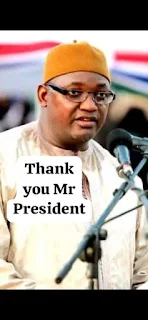Tuesday, May 6, 2025
GAF Warns Essa Faal And Samsudeen Sarr ToCease Misleading Statements
The Gambia Armed Forces (GAF) has issued a press release cautioning former Army Commander Samsudeen Sarr and aspiring presidential candidate Essa Mbaye Faal against making misleading public statements that misuse the name of the Armed Forces for political gain.
GAF expressed serious concern about a trend of unfounded commentary surrounding its operations within the democratic framework of The Gambia. The military institution highlighted specific remarks from Sarr, who referenced an isolated incident involving the Senegalese Gendarmerie and questioned the presence of GAF soldiers at key security installations. Such narratives, according to GAF, misrepresent the professionalism and non-partisan nature of the military.
Faal, in a recent interview, alleged government neglect of the GAF, claims that GAF describes as unfounded and potentially harmful. Such assertions politicize the Armed Forces, eroding public confidence in an institution committed to reform and accountable under democratic civilian authority.
The GAF High Command condemned these unethical comments, which they believe detract from national cohesion and could compromise security. They reiterated their commitment to professional standards and operational integrity in alignment with the Security Sector Reform agenda.
In its statement, GAF called on Sarr and other public figures to refrain from disparaging the military. The Armed Forces also urged political parties and media outlets, including West Coast Radio, to uphold professional ethics and avoid involving the military in political discourse.
GAF reaffirmed its dedication to maintaining peace and security in The Gambia and contributing to the nation’s socio-economic development. They encouraged all Gambians to support the Armed Forces in its mission to transform into a professional and democratically accountable institution.
Signed,
Colonel Lamin K. Sanyang
Director of Press and Public Relations
Gambia Armed Forces
6 May 2025
Friday, April 25, 2025
In Defence of Lawyer Mai Ahmad Fatty
By Yaya Dampha
Mai Ahmad Fatty’s bravery and dedication to the cause of
democracy in The Gambia cannot be overstated. His willingness to confront the
oppressive regime of Yahya Jammeh, even in the face of life-threatening
dangers, exemplifies true courage. The assassination attempt where a truck was
deliberately driven into his car serves as a stark reminder of the lengths to
which dictators will go to silence dissent.
Despite these harrowing experiences, Fatty’s resilience
shone through as he not only survived but also became a pivotal figure in the
fight for democratic governance in The Gambia. By founding his own political
party and rallying support from the Gambian diaspora, he has played an
instrumental role in advocating for democracy and human rights.
Mai Ahmad Fatty deserves respect and recognition for his
contributions to the struggle for freedom in The Gambia. His story is a
testament to the power of perseverance and the importance of standing up
against tyranny. It is vital that we remember and honor his sacrifices,
ensuring that they are woven into the fabric of our nation's history as we
continue to strive for a brighter future.Mai Ahmad Fatty’s advocacy and
political engagement reflect a commitment to the progress and development of
The Gambia a commitment underscored by the tangible advancements achieved under
President Adama Barrow’s leadership. In a nation that has long suffered from
neglect and mismanagement, it is vital to recognize the critical developments
that have unfolded in recent years.
Under President Barrow, The Gambia has witnessed a
transformation in infrastructure, with road networks expanding to connect
communities that have long been isolated. Access to electricity has reached the
most remote areas, illuminating lives that were previously shrouded in darkness
and deprivation. Healthcare services have improved significantly, making
essential medical care accessible to the marginalized populations that had been
overlooked for decades. Education services have also seen reinvigoration, providing
opportunities for the youth and fostering a brighter future for our nation
Mai Ahmad Fatty’s acknowledgment of these achievements is
not merely political maneuvering; it is a testament to his dedication to the
well-being of Gambians. Recognizing the progress made under the current
administration is crucial in fostering a constructive dialogue focused on the
future. While the struggle for democracy and human rights continues, it is
equally important to celebrate the milestones that have been reached and to
encourage more development-oriented initiatives for the benefit of all citizens.
As we reflect on the journey towards a democratic and
prosperous Gambia, let us embrace a spirit of collaboration and constructive
criticism. Mai Ahmad Fatty’s endorsement of developmental progress is an
invitation to all political actors to prioritize the needs of the Gambian
people above partisan squabbling. It is a call to work together in a shared
commitment to create a society where every individual can thrive, benefiting
from the liberties won through decades of struggle.
In recognizing the positive strides made, we bolster our
collective spirit and empower ourselves to continue the fight for a better
Gambia—one that honors both our past and our aspirations for the future. Let us
support leaders like Mai Ahmad Fatty, who advocate not only for justice and
accountability but who also appreciate the importance of development in
building a stronger, more united nation.
If someone sacrificed a minute for you try to respect them for a second.
Thursday, April 24, 2025
The NPP Government's Commitment to Reform and Progress
Defending Accountability: The NPP Government's Commitment to Reform and Progress
The recent dismissal of over one thousand workers in The Gambia, identified as "ghost workers" in a thorough audit, has ignited a wave of political criticism, primarily from certain journalists and opposition figures. These individuals have rushed to politicize the issue, alleging that the NPP government is to blame for employing these non-existent workers. However, such claims overlook the significant strides the government has taken towards accountability and reform within the labor sector.
The term "ghost workers" refers to those who remain on official payrolls yet are neither present nor contributing to their organizations. This issue is not unique to The Gambia; it has been a persistent challenge in various countries worldwide, especially in developing nations where systems of monitoring and accountability may not be as robust.
Acknowledging the Reality of Unaccounted Workers
Critics tend to focus solely on the recent firings, ignoring crucial factors that have led to this situation. Many of the affected employees were engaged in roles that did not involve regular clocking in—such as field workers in agriculture or education. The lack of digital timekeeping tools in these sectors presents a challenge in tracking actual attendance, making it easier for discrepancies to arise.
The NPP government has shown a commitment to addressing these fundamental issues. By undertaking a comprehensive audit to identify ghost workers, the administration has demonstrated its dedication to transparency and efficiency. This proactive approach signifies that the government is not only interested in worker accountability but also in ensuring that public resources are utilized effectively for the benefit of the Gambian people.
Progress Amid Criticism
It is crucial to recognize that the broader issue of ghost workers is exacerbated by economic migration and systemic inefficiencies—factors that have been longstanding challenges in our society. Many young civil servants, seeking better opportunities abroad, have left their posts, resulting in discrepancies in employment records. Instead of placing the blame on the government, journalists and critics should consider the complex socio-economic landscape that contributes to these challenges.
Moreover, while some journalists paint the narrative of governmental negligence, they fail to acknowledge the progress the NPP government has made. The introduction of modern work practices and technology is vital for mitigating the risk of ghost workers. By investing in digital solutions and transparent labor management systems, the NPP is taking significant steps to reform the public sector workforce.
A Call for Constructive Engagement
It is essential for journalists and commentators to engage constructively with these developments rather than resorting to politically charged accusations. The endless cycle of blame only serves to create division rather than fostering a cooperative atmosphere that can lead to meaningful change. The NPP government is tirelessly working towards building a transparent, accountable, and efficient public service, and we—all stakeholders—should support this mission.
In conclusion, rather than focusing solely on the issue of ghost workers through a polarizing lens, we should recognize the commendable efforts made by the NPP government to enhance accountability in the workforce. Embracing a collaborative approach to address these concerns can lead to a more effective governance model that ultimately benefits all Gambians. It is time to champion constructive dialogue and support the government's initiatives for a better, more accountable future.
Saturday, April 19, 2025
Fugitive Wandy Simaga Convicted for Firearm Possession Following Airport Escape
Wandy Simaga Found Guilty After Dramatic Escape and Subsequent Arrest
The Gambia Police Force has confirmed the conviction of Wandy Simaga, a fugitive who escaped from custody at Banjul International Airport on September 28, 2024. Simaga had been on the run until his capture on April 13, 2025, following an extensive manhunt.
Upon arriving in The Gambia aboard a Vueling Airline flight, Simaga was intercepted by security personnel and found in possession of two pistols, eight pepper sprays, and thirteen mobile phones, all suspected to be contraband. During a high-risk screening conducted by various law enforcement agencies, he managed to evade capture and escape the scene.
Following his recapture, Simaga was arraigned before Her Worship Anna O. Mendy, Principal Magistrate at the Brikama Magistrates’ Court. He faced two serious charges:
1. Importation of prohibited firearms, in violation of Section 6 of the Arms and Ammunition Act (Cap 20:01)
2. Possession of firearms without authority, contrary to Section 8 of the same Act.
In court, the charges were read and explained to Simaga in Mandinka, to which he pleaded guilty. He accepted the facts presented without objection.
As a result, he was convicted and sentenced as follows:
- Count One: a fine of D100,000 or two years’ imprisonment
- Count Two: a fine of D100,000 or two years’ imprisonment
The sentences are set to run consecutively, meaning Simaga faces a total of four years in prison if he is unable to pay the fines. Additionally, the court ordered the forfeiture of the two pistols—designated as Exhibits A and B—to the state, following the prosecution's request in accordance with Section 25(3) of the Arms and Ammunition Act.
The Gambia Police Force praised the successful resolution of the case, reaffirming its commitment to pursuing fugitives, upholding justice, and safeguarding national security.
Friday, April 18, 2025
Reflecting on Yahya Jammeh's Complicated Legacy
By alhagie Suntou Touray
Truth, Compassion, and the Path to National Healing: Reflecting on Yahya Jammeh's Complicated Legacy
Yahya Jammeh’s legacy is far from one-dimensional, a fact that demands careful consideration. While many Gambians benefited from his policies—including scholarships, financial assistance, and initiatives like the Presidential Award for Young Entrepreneurs and Professionals (PaJEP)—it is equally important to confront the darker aspects of his rule.
As a former president, Jammeh was, like all humans, capable of making mistakes. However, the mistakes made during his presidency were not trivial. They were profound and, regrettably, resulted in the loss of lives, freedom, and dignity for numerous Gambians.
For those who still support and admire Jammeh, the most honorable response is not to perpetuate blind loyalty but to acknowledge his missteps with sincerity. The teachings of the Noble Prophet Muhammad (peace be upon him) remind us that when significant wrongs are committed, the righteous path is one of Tawba—repentance. This process involves seeking forgiveness both from God and from those who have been harmed, marking the beginning of emotional accountability and representing an act of strength rather than weakness.
What is particularly alarming is the reluctance among some to acknowledge the consequences of Jammeh’s actions, opting instead to defend the indefensible. This stance reflects a troubling lack of compassion and diminishes the suffering experienced by countless victims and their families.
The Gambian people are inherently forgiving, and for some, supporting Jammeh may offer personal solace. However, it must never come at the expense of truth. Such support should not diminish the pain endured by others or invalidate the experiences of those who suffered under his regime.
Speaking from personal experience, in December 2007, I was detained at the Navy Headquarters. I was fortunate to be released unharmed, thanks to the intervention of a naval officer on duty. Had he not been present, I could easily have become another name among the many Gambians who faced brutal torture or disappearance. That moment, rather than leaving me bitter, serves as a testament to the precariousness of survival for so many.
It is crucial to recognize that, while Jammeh’s administration had its benefits—like facilitating access to civil service jobs for previously marginalized groups and sponsoring spiritual pilgrimages for many supporters—these contributions do not erase the serious human rights violations that also marked his time in power. It is only human to feel gratitude for the positive aspects of his governance. Yet, it is equally essential to express empathy for those who bear the scars of his regime.
We must create space for dual truths: that some Gambians thrived under Jammeh's leadership while others suffered irreparably. A healthy society is one that can hold these truths together, allowing for a rich and nuanced understanding of our past.
I think of my late friend, Ebrima Solo Sandeng—may Allah grant him eternal peace. He epitomized principles of compassion and humanity, and to his family, as well as to the families of all victims of past injustices, I extend my deepest prayers: may Allah grant them Jannah and peace.
The journey toward national healing begins with acknowledgment. It is only through confronting our past with honesty and compassion that we can work toward reconciliation, justice, and unity.
Thursday, April 17, 2025
Government Stops Over 1,424 Absentee Workers’ Salaries, Recommends Summary Dismissal
According to the press release issued by the office of spokesperson president Ebrima G Sankareh over one thousand unaccounted workers will be summarily dismiss.
Bellow is the full text of the press release.
The Gambia Government Stops Over 1,424 Absentee Workers’ Salaries, Recommends Summary Dismissal Per PSC Regulations No. 57
Banjul, The Gambia - The Gambia Government announces that The Ministry of Public Service, Administrative Reform, Policy Coordination & Delivery through the Personnel Management Office (PMO), successfully carried out two phases of Staff Audit in the Fiscal Year 2024. Phase One covered the Ministries of Basic and Secondary Education, Health and Agriculture, Livestock & Food Security. The finalised report of this Staff Audit has resulted in the stoppage of over 1,424 unaccountable public servants’ salaries.
Accordingly, banks and relevant financial institutions where their salaries were deposited, have been duly notified to recover all wrongful salaries paid to these absentee Government employees. While the recovery process progresses, a list of the said perennially absentee staff has been submitted to the Public Service Commission (PSC) with recommendations to summarily dismiss them, and declare their positions vacant in accordance with PSC Regulations No.57.
The Second Phase of the Staff Audit conducted in December 2024, covered the rest of the Civil Service, which includes the Armed and Security Forces. Crucially, based on the preliminary reports of this Audit, some 679 Public Servants could not be physically identified. Consequently, their salaries will be initially stopped for the month of April, 2025 pending potentially genuine queries from affected staff.
Thereafter, a detailed list covering unseen staff will be published for wrongful salary recovery and immediate dismissal from the Service of The Gambia Government.
Both phases of Staff Audit were conducted together with Pensioners’ Audit, with a view to cleaning up of Government pensioners’ database of deceased beneficiaries.
Significantly, and consistent with global best practices, The Ministry of Public Service, is poised to put in place robust mechanisms and processes to circumvent persistent incidents of ghost workers on Government payroll for both active employees and pensioners. These Audit exercises are saving The Gambia Government millions of Dalasis on account of wrongful salary and pension payments.
Sign:
Ebrima G. Sankareh
The Gambia Government Spokesperson & Presidential Diaspora Adviser
Subscribe to:
Comments (Atom)



















